Classical music, like many art forms, requires financial support and belief in the existence of unique talent. In a Chicago Reader feature, author Samantha Ege discusses the influential women behind Florence Price, the first Black woman to have a symphony performed by a major American orchestra in 1933.
Ege’s book, South Side Impresarios: How Race Women Transformed Chicago’s Classical Music Scene, sheds light on Price’s legacy and the support she received from her community. Price, along with her peers Margaret Bonds and Nora Holt, were championed by a group of upper- and upper-middle-class south-siders, many of whom were women. These “Race women” played a crucial role in fostering the talent of Black classical artists in Chicago.
Ege’s book challenges the narrative of Price’s exceptionalism and highlights the communal efforts that supported these composers. She emphasizes the importance of recognizing the contributions of these “Race women” who have often been overlooked in classical music history.
While Ege’s book provides a social analysis rather than a narrative biography, it offers a comprehensive account of the networks and circumstances that facilitated the rise of composers like Price, Bonds, and Holt. The book also draws attention to contemporary Black female composers like Renée C. Baker, Regina Harris Baiocchi, and Jessie Montgomery, who continue to carry on the legacy of their predecessors.
Overall, South Side Impresarios offers a fresh perspective on the role of women in shaping Chicago’s classical music scene and challenges traditional narratives of classical music history. It highlights the importance of community support and collaboration in fostering diverse voices in the classical music world.









